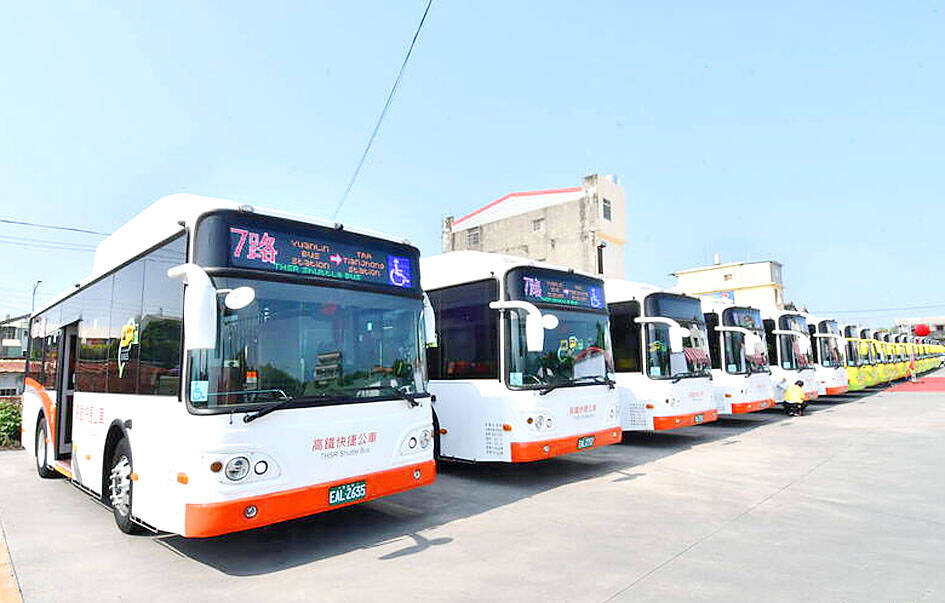The Executive Yuan yesterday approved a proposal to have 9,400 diesel-powered city buses across the nation replaced by electric buses by 2030 at a cost of NT$64.3 billion (US$2.09 billion).
The plan proposed by the Ministry of Transportation and Communications is part of the government’s efforts to reach its goal of net zero emissions by 2050.
City bus operators have been reluctant to procure electric buses because of their relatively poor performance, high price, scarcity of charging facilities, lack of logistics and maintenance services, and failure to implement localization of key technologies and components, the ministry said in a statement following yesterday’s Cabinet meeting.

Photo: Chung Li-hua, Taipei Times
After formulating new strategies and timelines to achieve the net zero goal, a three-year pilot project of electric buses was launched in 2020 through the efforts of the ministry, the Environmental Protection Administration and the Ministry of Economic Affairs, it said.
From 2020 to last year, 500 electric vehicles were designed, developed and produced by Taiwanese manufacturers for use by domestic operators, the transportation ministry said.
Taiwan has two electric bus manufacturers — RAC Electric Vehicle and Master Transportation Electric Bus — that have met localization requirements and begun mass production, it said.
Four other manufacturers are trying to meet localization requirements for electric buses, it said.
In the next seven years, the government would begin promoting the use of electric buses, the transportation ministry said.
“The nation still has about 9,400 diesel-powered buses to be replaced by electric buses by 2030,” it said. “To ensure sufficient funding for the project, we worked with the Environmental Protection Administration to jointly submit a plan to promote the use of electric buses from next year to 2030.”
Apart from vehicle purchase subsidies for bus operators, the plan also includes funds to establish maintenance systems, passenger transport operation subsidies and road network optimization, it said.
In the “Taiwan’s Net Zero Emissions Path and Strategy by 2050,” which was announced in March, 12 key strategies were proposed, one of which is electrification and decarbonization of public transportation and giving priority to passenger vehicles with mature technologies, it said.
“With the development of technology, other vehicles would be electrified or carbon-free, so the full electrification of city buses by 2030 would be significant,” it said. “It is also an important step for net zero emissions in 2050.”
The development of electric buses would also create manufacturing jobs and make Taiwan part of the international electric vehicle supply chain, it added.
To meet the goal of electrifying the entire nation’s fleet of city buses within seven years, about 1,300 buses would need to be replaced annually, Premier Chen Chien-jen (陳建仁) said.
“It is a government-wide effort to reach emissions goals. We are subsidizing the industry, and we are also asking local governments to assist bus operators and promote the electrification of their local fleets,” Chen said.

‘DENIAL DEFENSE’: The US would increase its military presence with uncrewed ships, and submarines, while boosting defense in the Indo-Pacific, a Pete Hegseth memo said The US is reorienting its military strategy to focus primarily on deterring a potential Chinese invasion of Taiwan, a memo signed by US Secretary of Defense Pete Hegseth showed. The memo also called on Taiwan to increase its defense spending. The document, known as the “Interim National Defense Strategic Guidance,” was distributed this month and detailed the national defense plans of US President Donald Trump’s administration, an article in the Washington Post said on Saturday. It outlines how the US can prepare for a potential war with China and defend itself from threats in the “near abroad,” including Greenland and the Panama

A wild live dugong was found in Taiwan for the first time in 88 years, after it was accidentally caught by a fisher’s net on Tuesday in Yilan County’s Fenniaolin (粉鳥林). This is the first sighting of the species in Taiwan since 1937, having already been considered “extinct” in the country and considered as “vulnerable” by the International Union for Conservation of Nature. A fisher surnamed Chen (陳) went to Fenniaolin to collect the fish in his netting, but instead caught a 3m long, 500kg dugong. The fisher released the animal back into the wild, not realizing it was an endangered species at

The High Prosecutors’ Office yesterday withdrew an appeal against the acquittal of a former bank manager 22 years after his death, marking Taiwan’s first instance of prosecutors rendering posthumous justice to a wrongfully convicted defendant. Chu Ching-en (諸慶恩) — formerly a manager at the Taipei branch of BNP Paribas — was in 1999 accused by Weng Mao-chung (翁茂鍾), then-president of Chia Her Industrial Co, of forging a request for a fixed deposit of US$10 million by I-Hwa Industrial Co, a subsidiary of Chia Her, which was used as collateral. Chu was ruled not guilty in the first trial, but was found guilty

DEADLOCK: As the commission is unable to forum a quorum to review license renewal applications, the channel operators are not at fault and can air past their license date The National Communications Commission (NCC) yesterday said that the Public Television Service (PTS) and 36 other television and radio broadcasters could continue airing, despite the commission’s inability to meet a quorum to review their license renewal applications. The licenses of PTS and the other channels are set to expire between this month and June. The National Communications Commission Organization Act (國家通訊傳播委員會組織法) stipulates that the commission must meet the mandated quorum of four to hold a valid meeting. The seven-member commission currently has only three commissioners. “We have informed the channel operators of the progress we have made in reviewing their license renewal applications, and